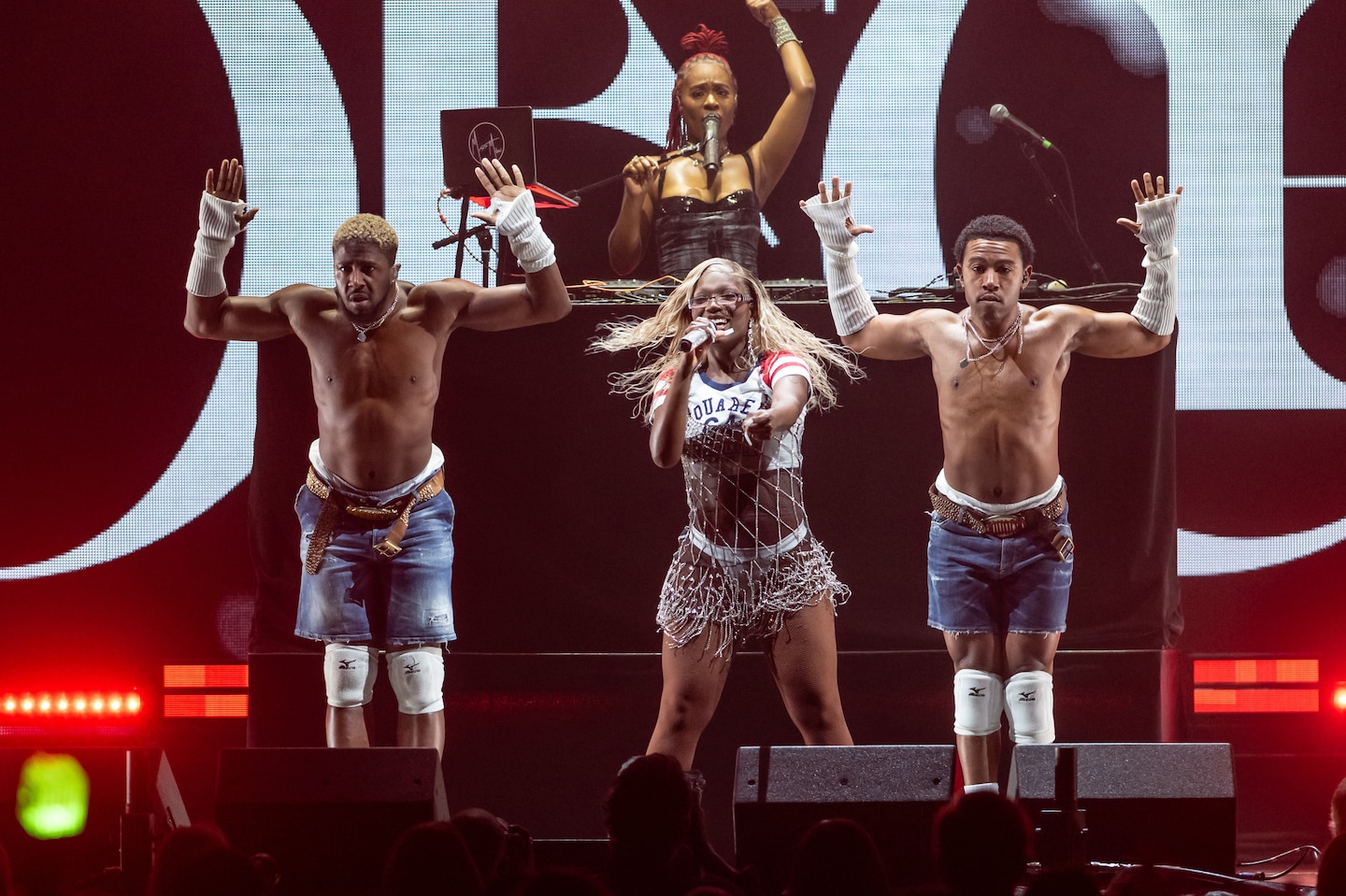To paraphrase cinema’s most infamous lech, the thing about pop music is that even as we get older, the stars stay the same age. That’s generally the promise of Jingle Ball, iHeartRadio’s traveling circus of pop radio hitmakers, which touched down Monday night at Capital One Arena. Amid a red-and-green light show that kept Pepco paid, the three-hour program showcased pop’s youth movement, along with a few acts whose hits already feel like oldies.
After an opening performance by K-pop girl group (G)I-dle, emcee duties were briefly handled by Jared Leto, the actor who moonlights as a rock star in Thirty Seconds to Mars. The erstwhile area resident shouted out “D.C. proper” before introducing singer-songwriter David Kushner. A baritone with a teen idol look that could get him cast as Jordan Catalano on a “My So-Called Life” reboot, Kushner makes moody folk-pop concerned with souls and salvation, and although he acknowledged the role of God and Jesus in his life, he should tithe to TikTok for the way the platform has turned his songs into viral hits.
TikTok might be the current coin of the realm, but until recently, TV competitions still minted pop stars. That’s the case for Melanie Martinez, who rose to prominence as a teenager on “The Voice.” These days, Martinez is really putting the art in art pop, wearing creature-feature prostheses and performing with her woodland dance crew in front of inflatable mushrooms. Her aesthetic is a bit of sleight-of-hand that elevates her grungy alt-pop songs, but that’s fine: Wasn’t Lady Gaga most exciting in her meat dress?
Big Time Rush is a throwback to an even earlier era: a Monkees-esque boy band created for a TV show that then took on a life of its own. After a seven-year hiatus, the four-piece reunited in 2021, just as its original fans were coming into the disposable income of their 30s. These days, the nostalgia window is even tighter than it was when the act missed the joke and turned Blur’s 1997 hit “Song 2” into a brostep anthem a decade ago.
That song shares a song-to-sample timeline with “I Ain’t Worried,” whereon OneRepublic turned the whistles of Peter Bjorn and John’s “Young Folks” into a single for the “Top Gun: Maverick” soundtrack. For years, the pop-rock act has churned out the new ambient music: not music for airports, but music for buying fast food and fast fashion. The band is fronted by Ryan Tedder, whose most memorable songs are usually for-hire, a point he made with a brief medley of recent hits he helped write for the likes of Taylor Swift and Lil Nas X and a stirring cover of Beyoncé’s “Halo.”
The kind of pleasant, genre-agnostic pop Tedder and company make is taken to its apotheosis by an act like NCT Dream. The seven-piece outfit is the latest example of how K-pop has streamlined the Nordic pop machine into an industry unto itself, polishing and manicuring hip-hop swagger, EDM pulse or whatever is in fashion beyond recognition. On Monday, “Broken Melodies” was far from broken: Crafted by Norwegian hitmakers Dsign Music, the song is airtight but algorithmic.
Jelly Roll, on the other hand, seemed to be offering the opposite of the algorithm: authenticity. Large and in charge, covered in tattoos and wearing a hat that boasted, in all caps, “HIGH CLASS WHITE TRASH,” the 39-year-old artist delivered the down-on-his-luck, heart-on-his-sleeve songs such as “Son of a Sinner,” “Need a Favor” and “Save Me” that have made him a country star.
As the Tennessean talent explained, he was raised on Waylon Jennings and Merle Haggard; Bob Seger and Lynyrd Skynyrd; and “gangsta rap,” a point he emphasized — flipping his cap backward — with a medley of songs by Eazy-E, DMX, Eminem, OutKast and Biz Markie. Jelly Roll is a good ol’ boy with hip-hop bona fides: He started his career by selling rap mixtapes out of his car, and his first album was released on Three 6 Mafia’s Hypnotize Minds imprint. Both sides of the coin came together on “Wild Ones,” a duet with 19-year-old singer Jessie Murph that showed off his rapid-fire flow.
For as long as it has existed, pop music has flattened forms forged by Black artists into safer sounds for White audiences. On Monday night, the influence of rap, R&B and dance music was taken as read, but it took until after 10 o’clock for an artist who could truly speak to the tradition — whether hip-house, Miami bass or ballroom — of bringing hip-hop attitude to the dance floor.
Doechii flows on the mic and in her dance moves. In a jersey top and a tinsel-trussed thong, the 25-year-old rapper-singer from Tampa flexed Nicki Minaj-inspired vocal tics on “Yucky Blucky Fruitcake” and served sexy grooves with “Persuasive” and a Kaytranada-produced remix of Ravyn Lenae’s “Xtasy.” She closed with her biggest hit, “What It Is,” which synthesizes TLC and Trillville samples into a street-love ballad in the tradition of “Me and My Girlfriend” and “’03 Bonnie & Clyde.” But without her duet partner, rapper Kodak Black, in attendance, the song’s most vulnerable couplet — “Being Black in America is the hardest thing to be / Every thug need a little love, too/ Baby, how ’bout me?” — went unsung.
If Doechii is dance-rap’s present and future, headliner Flo Rida is its regrettable past. The 44-year-old performed a handful of hits that have become staples on radio, as jock jams and in commercials, such as the Etta James-sampling “Good Feeling.” In that way, Flo Rida is the perfect headline for Jingle Ball, which featured interludes that promoted a discount wireless provider, a pharmaceutical brand and a military contractor. Instead of a Kiss Cam, there was an audience-focused karaoke session of “Jingle Bell Rock” that was actually a tie-in with the forthcoming “Mean Girls” musical movie. Was it music, nostalgia or advertising? Yes.
